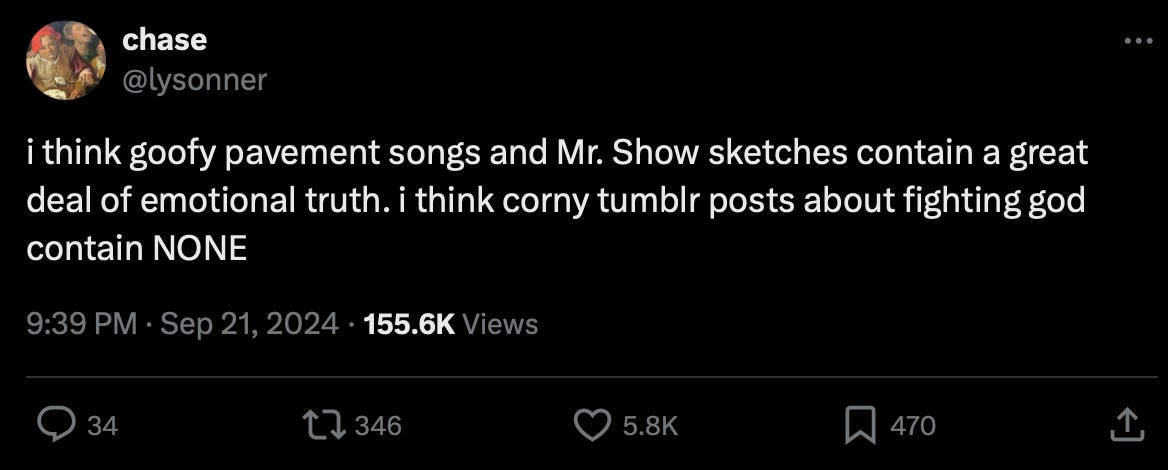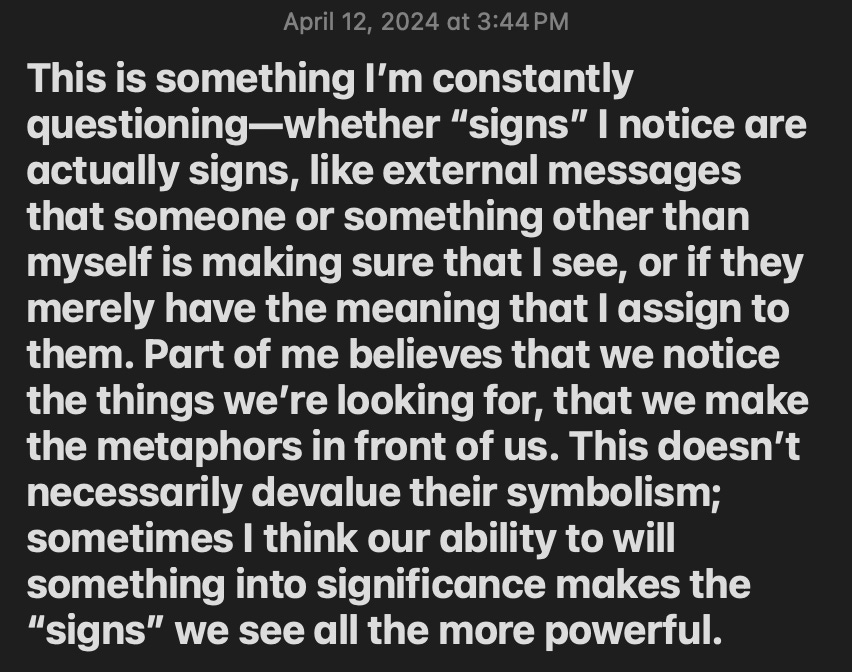This is a continuation of an essay I wrote back in June. You don’t need to read the first one to understand this one, but it would probably help.
I was only joking a little bit when I said that someday my friends and I will talk about the prime of Brat Summer, starting roughly when Charli XCX first blasted “360” from the roof of her car in Williamsburg and ending with the first Trump assassination attempt, the way that Baby Boomers talk about the Summer of Love. Every generation is destined and doomed to imbue their own era of youth culture with perhaps more depth than it deserves. This is part of why I’m so obsessed with nostalgia, why I love it and hate it in equally fervent measure, and why I can’t stop writing about it and preempting it.
On one hand, I recognize fetishism of the past as, in most cases, superficial, and in the worst cases, reactionary. The urge to recreate a bygone era (or, more likely, an idealized version of that era that’s been rewritten by the murkiness of time) is how you get MAGA and retvrn and any cultural or political movement that starts with “trad.” Liberalism is also guilty of its own, insidious “good old days” rhetoric—just look at the way Democrats have spent the past three election cycles trying to recreate the hollow, apolitical optimism of the Obama era and cozying up to conservatives instead of taking the concerns of progressives seriously. In all of these cases, romanticism of the past results from a filter of selective amnesia that allows only the good parts of that time period to pass through.
On the other hand, I think there’s something beautiful about how we’re compelled to make meaning of things that might otherwise be thought of as dumb or insignificant, that we’re capable of still squeezing joy out of something once it’s gone and letting our appreciation age gracefully. Sure, we tell ourselves stories in order to live and all that, but sometimes we tell ourselves stories because we’ve got a good story to tell!
I am in favor of romanticism when it’s constructive, and I believe that in the right circumstances, it can be. Of course, I’m not saying that every paint-by-numbers pop song or piece of reality tv schlock or animated franchise for children and immature adults deserves a million thinkpieces arguing, “Here’s why this thing is not only valid, but a brilliant artistic feat that should be put in the Library of Congress” Widespread acceptance of that sort of thing leads to anti-intellectualism, breeding a culture where Marvel movies take up 90% of your local cinema’s marquee and affirming that it’s actually cool and good for adults to exclusively read and watch children’s media. But maybe the core impulses of things like nostalgia and poptimism are—when used with awareness, moderation, and clear intentions—good?
In this light, I think of a quote from the introduction to Chuck Klosterman’s Sex, Drugs, and Cocoa Puffs:
The goal of being alive is to figure out what it means to be alive, and there is a myriad of ways to deduce the answer; I just happen to prefer examining the question through the context of The Real World and Pamela Anderson and Frosted Flakes. It’s certainly no less plausible than trying to understand Kant or Wittgenstein. And while half my brain worries that writing about Saved by the Bell and Memento will immediately seem as outdated as a 1983 book about Fantasy Island and Gerry Cooney, my mind’s better half knows that temporality is part of the truth.
I also turn to Rax King’s Tacky, which in many ways feels like a Klosterman descendant, a similar entry into the “low culture manifesto” canon. I’m specifically thinking of a passage in her essay “Three Small Words” which, in my personal copy, I’ve highlighted in a fittingly sickening shade of neon yellow. She writes:
If I hear a great three-minute pop song with a 1-4-5 chord progression that sounds so fucking perfect, that Jesus and Mary Chain jingle-like magic, I’ll replay the thing to death. If I read a tightly composed knot of a sentence, I’ll highlight it, underline it, dog-ear the page, and never let it go. Life is short. It’s important to attach oneself to the pisces that stick, regardless of whether somebody else believes the stuff is any good. And neat pop moments like these may not be good, but what they are is perfect: perfectly composed, perfectly arranged, perfectly produced, and gift-wrapped with a bow to land perfectly in our consciousness.
I think similarly about this post from twitter user Chase, and how I consider it an instant fucking classic because of how perfectly it crystalizes like 98% of my feelings about art and profundity and my constant internal battle of “It’s Not That Deep” vs. “But Maybe It Is Though?”:
OKAY ONE MORE REFERENCE IN THIS LITTLE QUOTATION COLLAGE AND THEN I SWEAR I’M DONE. This one’s from me. It’s far less articulate than the rest. I mean, I wrote it in my fucking notes app:
To try to sum it up more eloquently, I don’t think that assigning meaning to things that don’t seem overtly meaningful is always a lost cause. The “signs from the universe” that are actually more like “signs from us to the universe reflected back on ourselves” aren’t automatically rendered insignificant because they came from within and not from some external force. If anything, it reveals the powerful alchemy of the human spirit, that our thoughts and feelings and ideas and memories can elevate the silly and the frivolous to something higher. This by no means an excuse to narrativize your life to the point that it distracts you from actually living it or to make a rash decision because you saw angel numbers on a microwave (This is a reminder for myself as much as it is for you, reader. We are holding each other accountable for our—as my elementary school teachers and child psychologists called it— “overactive imaginations.”) Romanticize responsibly.
Bad tattoos on leather-tanned skin, Jesus Christ on a plastic sign, etc. Speaking of which, back to Brat:
I don’t think Charli killed Brat Summer with her now-infamous tweet heard ‘round the world, but it certainly didn’t help. Brat Summer would’ve ended naturally anyway, as every summer does. Its lightspeed ubiquity and breach of relatively niche containment sped up the process a bit, and by the time we got a lime green-drenched DNC and an SNL sketch that starred Bowen Yang as Charli XCX hosting her own talk show, Brat Summer’s body had already gone cold. As Arielle Gordon retroactively pondered in her eulogy for Brat Summer, “Could it survive being co-opted by brand executives who would keel over from one whiff of Rush? Or would it, like so many other online phenomena that broke free of the cloisters of the internet, shrivel and die in the real world, like a string of hosta flowers wilting in a heatwave?” She went on to mention CNN anchor Jake Tapper questioning “Is the idea that we’re all kind of Brat?” To quote a piece of wisdom Meaghan Garvey shared in the only article worth reading about the so-called “indie sleaze revival," “the moment people in your phone start saying something’s back, that’s when you know it’s over.”
Not to play the “I liked it before it was cool” card, but there’s no denying that sometimes being “your favorite reference” doesn’t hit the same when everybody and their mother gets the reference. The marketing strategy for Brat has been so wildly successful that the record’s philosophy has become a self-defeating one: if everything is Brat, then nothing is.
I still believe that the songs on Brat are great, but I don’t hear them the same way that I did when the record first dropped. The idea of Charli singing “I might say something stupid” to a sold-out Madison Square Garden feels alien to me; the idea of her singing “Spring breakers” at the Grammys—on the same night that she will likely take home a few of her own—feels hilarious, but not as outlandish as it did four months ago. When Charli wrote these songs, she was a relative underdog, the poster girl for pop’s middle class. Gay guys and their girl best friends worshiped her, your coworkers didn’t know who she was (or knew her as the girl who sang “Boom Clap.” Or “Fancy.” or “I Love It.”), music writers spent the better half of a decade calling her “the future of pop music.” But then the future caught up with her, and suddenly Charli was no longer “famous, but not quite.” She was famous for real.
“Girl, so confusing” is a really good song; “Girl, so confusing featuring lorde” is a phenomenal song (and so far the only Brat remix that feels like a significant level-up from its original iteration). Was the emotional Cold War between Charli and Lorde (and their subsequent hatchet-burial) autobiographical, or was it just kayfabe, two pop stars playing to an audience that loves a personal narrative? I don’t know and I don’t care! They’re telling a damn good story that speaks broadly to the experience of being a woman in a creative field and reconciling co-existing feelings of admiration, flattery, and jealousy that come with being compared to other women in said field. I still love “Girl, so confusing” and its remix because the beat bangs. And because in a sea of “girls’ girl” feminism and increasingly simplistic representation of “female friendship,” it’s refreshing to see the complexity of relationships between women taken seriously in such a nuanced way. And because frankly it’s been TOO DAMN LONG since we’ve gotten a theatrical, high-concept pop diva team up á la Lady Gaga and Beyoncé’s “Telephone” or Brandy and Monica’s “The Boy Is Mine.” And because at the end of the day I am still the same bitch I was in 2014 with my curly hair and too much eyeliner and computer tabs open to multiple Rookiemag articles and pastel grunge Tumblr blogs. But when I listen to the original “Girl, so confusing” now, it feels like watching a rerun of a classic episode when I’ve already seen the series finale and I know how the show’s gonna end.
“Do people realize how sad Brat is?” a friend asked me recently. I’m sure a lot of people do, though I don’t fault anyone for just listening to it as a fun, clubby pop record. There are the songs that are obviously heavier: Charli alluding to suicidal urges in “Sympathy is a knife,” mulling over the existential question of whether or not to become a parent on “I think about it all the time,” grieving her friend, mentor, and collaborator SOPHIE on “So I.” It’s probably the first song about SOPHIE that feels rightfully more focused on honoring her life than mythologizing her death, in part because of the way the lyrics delve into Charli and SOPHIE’s shared creative process and Charli’s regrets about keeping SOPHIE at an emotional distance while she was still alive.
But there’s a sadness on Brat that feels less up-front. Take the bookends of “360” and “365.” The former is a fun, celebratory pop song about being a cool, hot girl and an artistic innovator. It’s a thesis statement that kicks off the Brat era with the heel of a chunky black boot, as if to say: “Remember that ‘future of pop’ shit everybody who’s In The Know has been saying for years? The future is here, bitch!”
“360” gets its dark reprise in closer “365.” It’s jarring to follow up a stripped-back, stream-of-consciousness ballad about maybe wanting to have a baby, with a foggy, bass-heavy club track about doing shitloads of cocaine—to the point that your whole life becomes a neverending party and the party becomes your whole life (“No I’ll never go home / Don’t sleep, don’t eat / Just do it on repeat / Keep bumpin’ that”). It’s possibly hyperbolic and definitely nihilistic in a way that—like a lot of the songs on Brat—both glamorizes the archetypal party girl and reveals how hollow she is.
Even the optimism of “360” isn’t immune to this. It’s an It Girl anthem, but ephemerality is an inherent aspect of what makes an It Girl an It Girl. An It Girl is, by definition, of her era—loved or hated while she’s emblematic of her time, out of place once the world moves onto the next shiny new thing, If she’s lucky, she’ll age into well-earned nostalgia, as Chloe Sevigny does in her perfectly-cast “360” cameo. Perhaps twenty five years from now we’ll see a middle aged Charli XCX strutting through the video of a hot new pop star that she’s influenced. There I go again with my nostalgia forecasting.
Recently I reread the first installment of brat diaries recently and cringed, not because I think the writing is bad, but because I wanted to shout “girl, get OVER yourself!” This follow-up essay isn’t one that I ever intended to write, and once I started, it became much more heavy on the “brat” half of “brat diaries” than the “diaries” half that the original was primarily focused on. It’s not like I don’t still have the same concerns regarding my career, my reputation, my relationships, my sense of self, my future, but I was living in the Golden Age—or should I say Lime Green Age?—of Brat Summer. It was good while it was happening, great once it was gone.
I took two disposable cameras worth of photos over the summer and recently got them developed. They span roughly three months, five states, and countless cherished memories. When I think of the summer now, even though it’s barely over and where I live in North Carolina it’s still sunny and mid-to-high 70s, I remember it with the grainy, soft-focus flush of a disposable photo, wincing at the momentary rectangle of light when the flash is on. Or, I imagine myself a few years older, having grown into my wistfulness, a talking head in an imaginary documentary, waxing to the camera, “The summer of 2024, ugh, those were some wild times!” As I look off into the distance, you can hear the fuzzy synths and “ah-ah-ahhhh”s of “360” playing softly as a backing track, echoes of a bygone Brat Summer.





